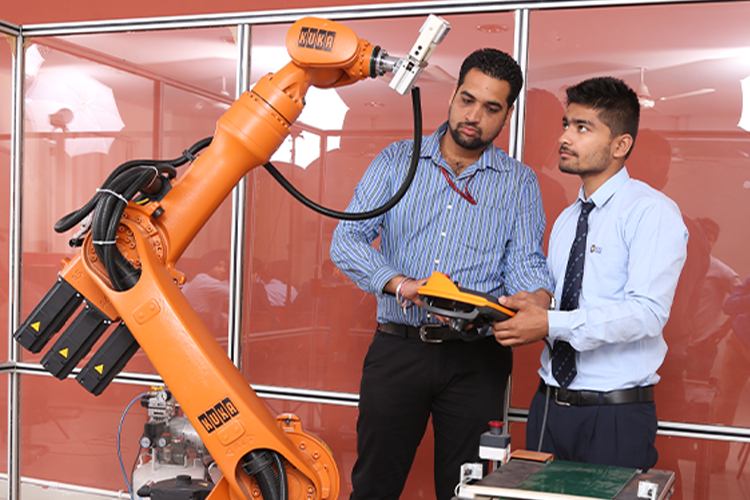Course Structure
The B.Tech(Computer Science and Engineering) program at Gulzar Group of Institutions offers a comprehensive curriculum spanning eight semesters.
Engineering Mathematics is a foundational course that provides students with essential mathematical concepts and techniques relevant to engineering applications. Topics covered include calculus, differential equations, linear algebra, and more.
Provides foundational knowledge in programming, algorithms, data structures, computer architecture, and software engineering, preparing students for advanced studies and professional careers in computer science and engineering.
Introduces the principles of object-oriented programming, including classes, objects, inheritance, polymorphism, and encapsulation, enabling students to design and develop modular, reusable, and maintainable software.
Electrodynamics and Optics covers electromagnetism principles, Maxwell’s equations, electromagnetic waves, and optics phenomena like reflection, refraction, and diffraction, crucial for understanding light and electromagnetic wave behaviour in engineering and physics.
Optimization Techniques encompasses methods to maximise or minimise functions under constraints. It involves algorithms like gradient descent, linear programming, and evolutionary strategies applied in engineering, economics, and operations research for efficient problem-solving.
Data Structures refers to the organisation, management, and storage of data for efficient access and modification. It includes arrays, linked lists, stacks, queues, trees, graphs, and hash tables, crucial for designing efficient algorithms and software applications.
Digital Logic Design focuses on designing and implementing digital circuits using logic gates, covering Boolean algebra, combinational and sequential logic, flip-flops, registers, and memory units for digital system development.
Discrete Structures deals with mathematical structures that are fundamentally discrete rather than continuous. Topics include set theory, logic, relations, functions, graphs, and combinatorics, essential for algorithm development and computer science applications.
Fundamentals of Electronics introduces basic concepts and components in electronic circuits, covering semiconductors, diodes, transistors, amplifiers, oscillators, and digital circuits essential for applications in communication and control systems.
Digital Electronics introduces students to binary systems, logic gates, and digital circuits. It covers topics like combinational and sequential logic, memory systems, and microprocessors, essential for understanding modern computing and electronic devices.
Object-Oriented Programming (OOP) is a software design paradigm that emphasises the organisation of code into objects, facilitating modularity, reusability, and efficient problem-solving through concepts like inheritance and polymorphism.
Computer Organization & Architecture encompasses the study of computer systems from a hardware perspective, focusing on how computers execute instructions and store information. Topics include CPU design, memory systems, instruction sets, and parallel processing.
An Operating System (OS) manages hardware and software resources, providing essential services for computer programs. It facilitates communication between applications and hardware, manages memory and processes, and ensures system security and stability.
Design and Analysis of Algorithms involves studying methods to develop efficient algorithms for solving computational problems and analysing their performance characteristics using mathematical and empirical methods.
Discrete Mathematics focuses on mathematical structures and concepts that are fundamentally discrete rather than continuous. It includes topics like set theory, logic, combinatorics, graph theory, and algorithms, foundational to computer science and other disciplines.
This subject covers the properties and applications of materials used in electrical and electronics engineering, including conductors, semiconductors, insulators, and magnetic materials, essential for designing and developing electronic devices.
This subject focuses on the design and implementation of system-level software, including operating systems, compilers, assemblers, and utility programs, which manage and support the computer’s hardware and application software.
This subject covers the systematic approach to the development, operation, maintenance, and retirement of software. It includes methodologies for software design, testing, project management, and quality assurance to ensure reliable and efficient software solutions.
This course explores integrated management of main business processes, often in real-time, mediated by software and technology. It includes the study of ERP systems, implementation strategies, and their impact on business efficiency and decision-making.
Database Management System covers the principles of database systems, including design, implementation, and management. Students learn about data models, SQL, normalisation, transaction management, and database security, preparing them for handling complex data structures.
Explores theoretical foundations of computer science, covering formal languages, automata, grammar, and computational models, enabling students to understand computation principles and design efficient algorithms.
Studies the design, implementation, and management of computer networks. Topics include network protocols, architectures, data transmission, and security, providing students with the skills to manage and optimise network systems.
Compiler Design involves studying the principles and techniques used in designing compilers for programming languages. It covers parsing, semantic analysis, optimization, and code generation, essential for translating high-level code into executable programs.
Artificial Intelligence explores the creation of intelligent systems capable of performing tasks that typically require human intelligence. It includes machine learning, natural language processing, computer vision, and robotics, preparing students to develop innovative AI applications.
Programming in Python covers the fundamentals of Python, including syntax, data structures, functions, and libraries. It emphasises practical application in various fields such as web development, data analysis, machine learning, and automation.
Computer Graphics explores the creation and manipulation of visual content using computers. It covers topics such as rendering, modelling, animation, and visualisation, enabling students to design and implement graphical applications and simulations.
Explore the foundations of web development, including HTML, CSS, JavaScript, and server-side scripting. Learn to build dynamic and interactive websites, focusing on design principles, client-server architecture, and web security.
Learn to apply computational techniques to biological data analysis, focusing on algorithms, data structures, and statistical methods. Study bioinformatics, genomics, and proteomics to solve complex biological problems and advance research.
Network Security & Cryptography involves protecting data during transmission by using encryption techniques to secure networks from unauthorised access, ensuring confidentiality, integrity, and authentication of information.
Data Mining and Data Warehousing involve extracting useful information from large datasets (Data Mining) and storing it in a structured way for analysis and reporting (Data Warehousing). These techniques are crucial for businesses to make informed decisions based on data-driven insights.
Distributed Databases involve managing and storing data across multiple networked locations. This approach ensures data availability, reliability, and performance, making it easier to access and manage large datasets distributed over different servers or geographic locations.
Computer Vision focuses on enabling computers to interpret and understand visual information from the world, utilising techniques in image processing, pattern recognition, and machine learning to analyse and process images and videos.
Agile Software Development emphasises iterative development, where requirements and solutions evolve through collaboration between cross-functional teams. It promotes adaptive planning, evolutionary development, early delivery, continuous improvement, and encourages flexible responses to change and uncertainty.
Gain hands-on experience through live projects in the IT domain, applying theoretical knowledge to real-world scenarios and enhancing practical skills in a dynamic work environment.





































